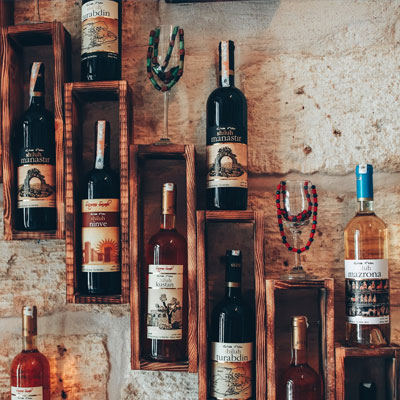Home · Business licenses
Import alcohol to Thailand
If you plan to sell or import alcohol in Thailand, you will have to acquire an alcohol license in order to operate your business legally.
Learn more
Alcohol import license
Two acts regulate the manufacturing, import and sale of alcoholic beverages in Thailand. It concerns the Liquor Act of 1950 and the Alcoholic Beverage Control Act of 2008. The first defines the term spirit or liquor as any material or mixture that contains alcohol and is consumable or becomes consumable after mixing with water or other liquids.
They are subdivided into two groups:
- Undistllled spirits — or mixtures of fermented spirits with distilled spirits with alcohol volume less than 15 degrees.
- Distilled spirits — or mixtures of distilled spirits with fermented spirits with alcohol volume more than 15 degrees (e.g. whiskey, brandy, rum, vodka, gin, etc.).
The Excise Department is not only responsible to collect the excise tax on alcohol; they are also the regulatory agency for alcohol production and distribution (in accordance with the Liquor Act B.E. 2493). The licensing system of the Excise Department obliges the licensee to sell the above-mentioned alcoholic beverages in line with Thai regulation.
One should apply for an alcohol license with The Excise Department (Ministry of Finance) if it is their intention to:
- Alcohol production and possession of related equipments
- Import more than one litre of alcohol
- Transport of untaxed alcohol from a factory
- Transport of more than ten (10) litres of alcohol
- Transport more than one liter but less than ten (10) liters of alcohol between specified territories (provinces)
- Sell alcoholic beverages
The Liquor Act prohibits license holders to sell alcoholic beverages: a) to people younger than 20 years or those people that lose their consciousness when they drink; b) between 12 pm and 11 am and from 2 pm to 5 pm and c) ‘within’ or ‘next to’ educational and religious areas.
Import of alcohol
First of all, before importing alcohol that was not manufactured in Thailand, one should receive the approval of the officer of the Excise Department. A form “SOR2/74” will have to be completed and a fee per issued license will have to be paid to the officer:
- 200 THB/issued license when imported for trade; or
- 50 THB/issued license when import for non-trade activities
The other documents required for a license depend on whether one has an intention to trade or not:
Import for trade
- Copy of liquor selling license Type 1 (see below)
- Copy of Invoice and Performa invoice
- Letter of label approval (Except wine)
- Sample of label only wine
- Copy of household registration of business place or lease contract
- Copy of the ID card (if it concerns a physical person) or a certificate of registration in case of a juristic person
- Power of attorney
Import for non-trade
- Copy of the (Performa) invoice
- Copy of the ID card (if it concerns a physical person) or a certificate of registration in case of a juristic person
- Power of attorney
In principle, one should receive this license within 30 minutes.
Import duties
Apart from the liquor license, duties are levied on imported goods before they are released from the custody of Customs:
- Customs import duties
- Excise tax for Excise Department and Interior Tax
- Value Added Tax (VAT) for the Revenue Department
Import duties are imposed at a specific rate, an ad valorem rate, or at a compound basis. The base of the ad valorem rate is determined by the domestic value (‘true market value’) of the imported good, calculated at the official exchange rate. The true market value of the goods is the wholesale cash price (duties excluded) for which similar goods would be sold and thus the prices actually paid or payable are used. The compound basis is a combination of the two others rates, very Thai and simple: “whichever of both gives the highest amount of duties, will be the rate applied”.
Most of the imported goods are subject to import duties between 5 and 60%, but this percentage may be reduced or even eliminated under a Free Trade Agreement (FTA) or the ASEAN Free Trade Area (AFTA). Although AFTA does not apply a common external rate on imported goods – which is, for example, the case for the European Union – the ASEAN countries do apply lower rates if goods are imported out of the one of the member-countries (between zero and 5%) known as the Common Effective Preferential Tariff scheme.
For what concerns wine and beer of an alcoholic strength by volume not exceeding 15% or, exceeding 15% but not exceeding 23% (fermented liquors):
| Exporting Country | AD Valorem Rate (%) until 31/12/2012 |
|---|
| The Customs Tariff Decree B.E. 2530 (Ceiling Rate) | 60 |
| ASEAN — Australia — New Zealand | 20 |
| ASEAN — China Free Trade Agreement | Exempted |
| ASEAN — Japan | 32.7 |
| ASEAN — Korea | Exempted |
| ATIGA | Exempted |
| FTA Thai — Australia | 12 |
| Exemption and Reduction of Customs Duty for the Goods Originating in Japan | 27.27 |
| FTA Thai — New Zealand | 9 |
| Thai — Peru | 24 |
Excise tax
The excise tax is an indirect tax imposed on certain goods – manufactured in Thailand or imported – when they leave the factory or warehouse or come into the country. The excise tax is amongst others levied on petroleum, beverages, electrical appliances, perfumes and motor vehicles. As for import duties, the excise tax is imposed either at a specific rate (based on the volume of alcohol content) or at an ad valorem rate (a percentage of the value of the product) and range from one to 50%. The latter is most commonly used here.
Import duties
The VAT is an indirect tax on the value added to goods and services at each stage of production and distribution and is due and levied by all retailers, manufacturers, wholesalers, producers, importers of goods and services providers. The standard VAT rate is a flat rate of 7%. For imported goods, VAT filings and tax payments must be presented at the Customs Department at the moment of import. Do note that small entrepreneurs whose annual turnover is less than 1.8M THB are exempted from VAT.
Apart from the above-mentioned taxes, imported alcohol is also subjected to local taxes, Thai health taxes and TV taxes, respectively amounting to 10%, 2% and 1.5% on the excise tax. The import duties, excise taxes, and VAT cumulated, the tax burden on most imported spirits is approximately 400 percent.
Special license for trading
alcohol in Thailand
If you import alcohol in order to sell it in a shop, to another distributor or in your own restaurant of bar, you additionally need an alcohol license Type 1. In order to receive this license, you must complete the “SOR.2/64” form at the Excise Department where the business is located. The license fee thereof is 8,250 THB a year. A copy of the (Performa) invoice as well as a sample of the label will have to be provided.
The latter, which is required for all packaged alcohol products that are imported into Thailand, has to be in Thai or English and has to mention the following items:
- Customs import duties
- The name of the product
- The alcoholic degree, which has to comply with the Thai Industrial Standards of the Ministry of Industry
— Alcoholic degree must not be over 0.5 degree
— Alcoholic degree must not be less 1 degree
- The volume
- The name and location of the alcohol manufacturer
If all of the above is in order, the Officer of the Excise Department will issue an alcohol import license (Form “SOR 1/65”). The issued license fee is 200 THB.
Do note that the alcoholic degree of wine that is imported via the Bangkok custom house, Laemchabang custom house, Nongkai custom house, Phibunmangsahan custom house or Suvarnabumi custom house etc. are approved case by case.
All the above is required when the alcohol is imported to Thailand for the first time or when the label is changed.
The types of licenses
| Capacity of person applying | Responsible Thai Authority | Yearly fee (*) or fee per issued license (**) | Timeframe |
|---|
|
License Type 1
Import and sale of more than 10 litres/time of alcohol not manufactured in Thailand/wholesale |
|||
| Physical or juristic person | Officer of Excise Department | 8,250* |
In case of new applicants: In case of old applicants: |
|
License Type 2
Sale of more than 10 litres/time of alcohol manufactured in Thailand/wholesale |
|||
| Physical or juristic person | Officer of Excise Department |
1. Alcohol manufactured in Thailand Less than 6,000 litres: 220 6,000 – 20,000 litres: 660 20,000 – 32,000 litres: 1,320 32,000 and more litres: 1,650 2. Licensee manufactures and sells alcohol Local fermentation liquor: 110 Local distillation liquor: 220* |
In case of new applicants: In case of old applicants: |
|
License Type 3
Sale of less than 10 litres per time of alcohol not manufactured in Thailand/retail |
|||
| Physical or juristic person | Officer of Excise Department |
Bangkok Municipality and Pattaya: 1,650* Anywhere else: 1,100* |
10 minutes |
|
License Type 4
Sale of less than 10 litres per time of alcohol manufactured in Thailand/retail |
|||
| Physical or juristic person | Officer of Excise Department |
Bangkok Municipality and Pattaya: 110* City and Tambon Municipality: 55* Anywhere else: 11* |
10 minutes |
|
License Type 5
Sale of less than 10 litres of alcohol not manufactured in Thailand to drink at the selling place, but only temporary (not more than 10 days) |
|||
| Physical or juristic person | Officer of Excise Department | 110** | 10 minutes |
|
License Type 6
Sale of alcohol manufactured in Thailand of less than 10 litres/time but only temporary (not more than 10 days) |
|||
| Physical or juristic person | Officer of Excise Department |
Bangkok Municipality and Pattaya: 55** City and Tambon Municipality: 27.50** Anywhere else: Free |
10 minutes |
| License Type 7 | |||
| Association or club house | Officer of Excise Department |
For selling all type of liquors: 220* For selling liquors which are manufactured in Thailand: 55* |
10 minutes |
*Price shown in Thailand Baht (฿) |
|||
Required documents
For license Type 1, 2, 3, 4, 5 & 6
1. Application form “Sor 2/64”
2. Required documents:
- In case of a physical person: copy of ID card and copy of household registration of trader or lease contract.
- In case of a juristic person: a copy of the certificate of the juristic person, copy of the ID card of the director and a power of attorney.
- In case you are applying for a Type 1 or Type 2 license, a map of the business place and a letter for liquor stock examination are required. The liquor stock will also have to be examined.
For license Type 7
- Application form “Sor 2/64”
- Copy of the certificate of association
- Copy of the ID card of the director
- Power of attorney
Ready to get started?
Let us guide you in making your company’s activities fully compliant and watertight.
Request a quote
Talk to our Business License Expert
If you have any inquiries, simply reach out to us and one of our friendly consultant will assist you.
Chat with us
...or give us a call
We're open from 9am to 6pm Monday to Friday.